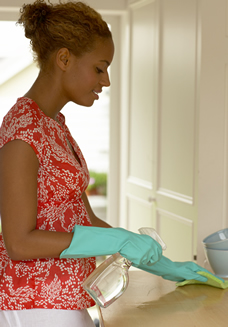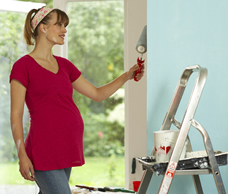Lifestyle Hazards to Avoid While Pregnant

In this article, you will find:
Hazards at home and other common concerns
Many of us use chemicals daily in and around the home. In addition to personal products, such as bath oils, deodorants, and hairsprays, we also keep dozens of other substances around the home, including cleaning fluids, detergents, bleach, and air fresheners.
When products are used in accordance with the manufacturers' instructions, there is little chance of them causing harm in pregnancy. However, minute traces of chemicals can enter the bloodstream, either through the skin or by inhalation, and cross the placenta. While there is no hard evidence to show that this has an ill effect, it makes sense to minimize the chances of chemicals from reaching a developing baby.
When using products, wear rubber gloves to prevent skin contact and ventilate rooms. To avoid inhaling mists or vapors, choose nonaerosol products. Also, choose products recommended for their low environmental impact, which contain fewer chemicals. Where possible, use natural alternatives to chemicals.
Painting and decorating
It's important to stay safe while doing home projects. Don't climb up ladders or stand on tables to reach high places since your belly alters your center of balance. Also avoid skin contact or inhalation if you use oil-based paints; spray paints; paint strippers; floor varnishes; and sealant adhesives. Make sure rooms are well ventilated while decorating, and, ideally, get someone else to do the decorating.
Pets and infections
Certain infections that could harm the fetus can be picked up from pets. The parasitic infection toxoplasmosis is spread through contact with cat feces. It may produce flulike symptoms, or no symptoms at all, and many unknowingly acquire immunity through previous exposure. However, although it rarely happens, contracting toxoplasmosis for the first time in pregnancy can cause serious problems, such as miscarriage or birth defects. Other pets, such as dogs, caged birds, and turtles can carry salmonella bacteria. Salmonella infection doesn't directly harm the baby, but can make a pregnant woman ill.
Being scrupulous about hygiene helps you avoid such infections. Wear rubber gloves when handling a cat litter box, cleaning cages where animals are kept, or disposing of dog feces, then wash your hands (and the gloves) afterward. Wear gloves also for digging or weeding in case animals have defecated in the garden. Or get someone else to do these tasks.
Toxoplasmosis and salmonella can also be contracted from eating undercooked or raw meat or eggs, so be careful with kitchen hygiene and cooking (see Dietary precautions).
The radiation emitted by cell phones is "non-ionizing." This is not the same as the radiation received from X-rays, which can be harmful in large doses. There is no evidence to show that using a cell phone is a health risk to either you or your baby.
In the past there has been some debate about whether it's safe to swim in chlorinated pools during pregnancy. However, now most experts believe that swimming in chlorinated water does not pose any health risks for pregnant women and their developing babies. You may find that the smell of chlorine might add to your nausea if you are suffering from morning sickness, although this is less of a problem in an outdoor pool. Try not to swallow the water, and shower when you come out of the pool. Swimming has great benefits during pregnancy. It has a low risk of injury while providing a good cardiovascular workout and improving muscle tone, so don't be put off by unnecessary worries.
Nicotine is known to decrease the blood supply to the fetus. This could affect the baby's growth, especially in early pregnancy. Although tobacco substitutes such as patches, gum, and lozenges deliver less nicotine to your body than smoking, you should never use them without a doctor's advice. Ask your doctor for information on safer ways to beat cigarette and nicotine cravings.

Wearing rubber gloves when using household cleaning products will reduce your exposure to chemicals.

Opt for "greener" paints and keep rooms ventilated while decorating.